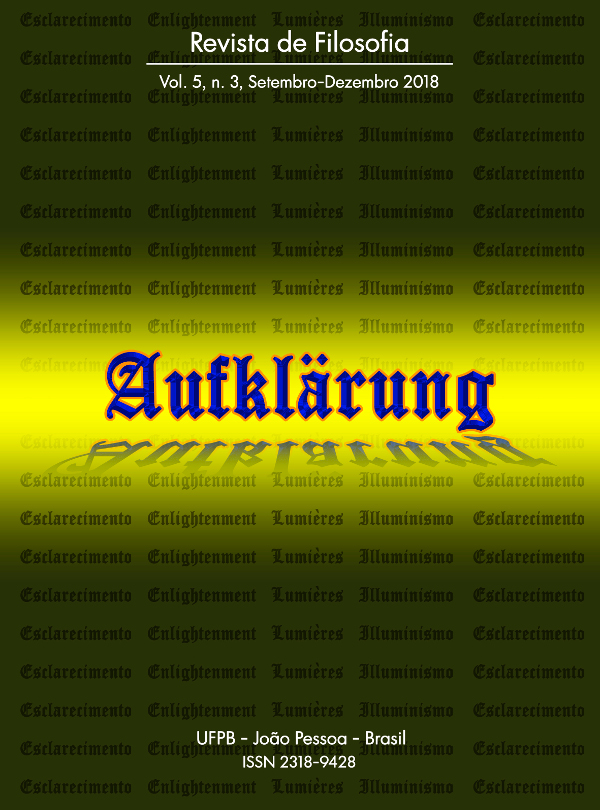Particle physics and the conscious mind: debating Almada’s optimism
DOI:
https://doi.org/10.18012/arf.2016.42250Palavras-chave:
Standard Model of Particle Physics, Emergentism, NeurophenomenologyResumo
Beginning with a study of the basic components of the physical world, Almada is developing an explanation of the emergence of the conscious mind. In order to recognize and publicize this enterprise, which is not yet finished, this note (i) offers an overview of Almada’s approach; (ii) challenges his optimism with the well-known hard problem of consciousness; and (iii) argues that his research can be pushed ahead by a coherent conceptual account of emergence.Downloads
Referências
ALMADA, L. F. In search of the theoretical and conceptual foundations of the mind-problem: what does physics have to say about the basic constitution of the world? Philósophos, v. 22, n. 1, p. 107-140, 2017. (quoted as 2017a) http://dx.doi.org/10.5216/phi.v22i1.41954
ALMADA, L. F. The mind-body problem from an emergentist approach: a defense of physicalism based on the levels of complexity of the nature and on the irreducibility of emergent properties. Dissertatio, v. suppl. 5, p. 73-97, 2017. (quoted as 2017b)
BEDAU, M.; HUMPHREYS, P. Introduction. In: BEDAU, M.; HUMPHREYS, P. (Eds.) Emergence: contemporary readings in philosophy and science. Cambridge, MA: The MIT Press, 2008. p. 01-06. http://dx.doi.org/10.7551/mitpress/9780262026215.001.0001
BOCKELMAN, P.; REINERMAN-JONES, L.; GALLAGHER, S. Methodological lessons in neurophenomenology: review of baseline study and recommendations for research approaches. Frontiers in Human Neuroscience, v. 7, article, 608, p. 01-09, 2013. https://doi.org/10.3389/fnhum.2013.00608
BUNGE, M. Matter and mind: a philosophical inquiry. New York: Springer, 2010.
CHALMERS, D. Facing up to the problem of consciousness. Journal of Consciousness Studies, v. 2, n. 3, p. 200-219, 1995.
HEMPEL, C.; OPPENHEIM, P. Studies in the logic of explanation. Philosophy of Science, v. 15, n. 2, p. 135-175, 1948. https://doi.org/10.1086/286983
MAJEED, R. The hard problem & its explanatory targets. Ratio, v. 29, n. 3, p. 298-311, 2016. https://doi.org/10.1111/rati.12103
POZZO, T.; PAPAXANTHIS, C.; STAPLEY, P.; BERTHOZ, A. The sensorimotor and cognitive integration of gravity. Brain Research Reviews, v. 28, n. 1-2, p. 92-101, 1998.
THOMPSON, E.; LUTZ, A.; COSMELLI, D. Neurophenomenology: an introduction for neurophilosophers. In: BROOK, A.; AKINS, K. (Eds.) Cognition and the brain: the philosophy and neuroscience movement. New York: Cambridge University Press, 2005. p. 40-97.
VARELA, F. Neurophenomenology: a methodological remedy for the hard problem. Journal of Consciousness Studies, v. 3, n. 4, p. 330-349, 1996.
ZEE, A. Quantum field theory in a nutshell. Princeton: Princeton University Press, 2010.
Arquivos adicionais
Publicado
Como Citar
Edição
Seção
Licença
Política de Direito Autoral para os itens publicados pela Revista:
1.Esta revista é regida por uma Licença da Creative Commons aplicada a revistas eletrônicas. Esta licença pode ser lida no link a seguir: Creative Commons Attribution 4.0 International (CC BY 4.0).
2.Consonante a essa politica, a revista declara que os autores são os detentores do copyright de seus artigos sem restrição, e podem depositar o pós-print de seus artigos em qualquer repositório ou site.
Política de Direito de Uso dos Metadados para informações contidas nos itens do repositório
1. Qualquer pessoa e/ou empresa pode acessar os metadados dos itens publicados gratuitamente e a qulquer tempo.
2.Os metadados podem ser usados sem licença prévia em qualquer meio, mesmo comercialmente, desde que seja oferecido um link para o OAI Identifier ou para o artigo que ele desceve, sob os termos da licença CC BY aplicada à revista.
Os autores que têm seus trabalhos publicados concordam que com todas as declarações e normas da Revista e assumem inteira responsabilidade pelas informações prestadas e ideias veiculadas em seus artigos, em conformidade com a Política de Boas Práticas da Revista.






































